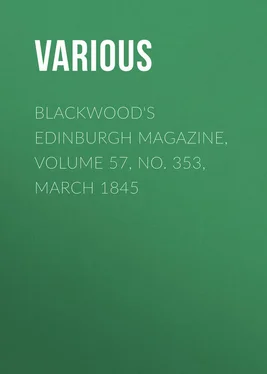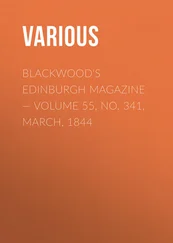Various - Blackwood's Edinburgh Magazine, Volume 57, No. 353, March 1845
Здесь есть возможность читать онлайн «Various - Blackwood's Edinburgh Magazine, Volume 57, No. 353, March 1845» — ознакомительный отрывок электронной книги совершенно бесплатно, а после прочтения отрывка купить полную версию. В некоторых случаях можно слушать аудио, скачать через торрент в формате fb2 и присутствует краткое содержание. Издательство: Иностранный паблик, Жанр: periodic, foreign_edu, Путешествия и география, на английском языке. Описание произведения, (предисловие) а так же отзывы посетителей доступны на портале библиотеки ЛибКат.
- Название:Blackwood's Edinburgh Magazine, Volume 57, No. 353, March 1845
- Автор:
- Издательство:Иностранный паблик
- Жанр:
- Год:неизвестен
- ISBN:нет данных
- Рейтинг книги:5 / 5. Голосов: 1
-
Избранное:Добавить в избранное
- Отзывы:
-
Ваша оценка:
- 100
- 1
- 2
- 3
- 4
- 5
Blackwood's Edinburgh Magazine, Volume 57, No. 353, March 1845: краткое содержание, описание и аннотация
Предлагаем к чтению аннотацию, описание, краткое содержание или предисловие (зависит от того, что написал сам автор книги «Blackwood's Edinburgh Magazine, Volume 57, No. 353, March 1845»). Если вы не нашли необходимую информацию о книге — напишите в комментариях, мы постараемся отыскать её.
Blackwood's Edinburgh Magazine, Volume 57, No. 353, March 1845 — читать онлайн ознакомительный отрывок
Ниже представлен текст книги, разбитый по страницам. Система сохранения места последней прочитанной страницы, позволяет с удобством читать онлайн бесплатно книгу «Blackwood's Edinburgh Magazine, Volume 57, No. 353, March 1845», без необходимости каждый раз заново искать на чём Вы остановились. Поставьте закладку, и сможете в любой момент перейти на страницу, на которой закончили чтение.
Интервал:
Закладка:
So passed away from earth one out of those sisters that made up my nursery playmates; and so did my acquaintance (if such it could be called) commence with mortality. Yet, in fact, I knew little more of mortality than that Jane had disappeared. She had gone away; but, perhaps, she would come back. Happy interval of heaven-born ignorance! Gracious immunity of infancy from sorrow disproportioned to its strength! I was sad for Jane's absence. But still in my heart I trusted that she would come again. Summer and winter came again – crocuses and roses; why not little Jane?
Thus easily was healed, then, the first wound in my infant heart. Not so the second. For thou, dear, noble Elizabeth, around whose ample brow, as often as thy sweet countenance rises upon the darkness, I fancy a tiara of light or a gleaming aureola in token of thy premature intellectual grandeur – thou whose head, for its superb developments, was the astonishment of science 4 4 " The astonishment of science. " – Her medical attendants were Dr Percival, a well-known literary physician, who had been a correspondent of Condorcet, D'Alembert, &c., and Mr Charles White, a very distinguished surgeon. It was he who pronounced her head to be the finest in its structure and development of any that he had ever seen – an assertion which, to my own knowledge, he repeated in after years, and with enthusiasm. That he had some acquaintance with the subject may be presumed from this, that he wrote and published a work on the human skull, supported by many measurements which he had made of heads selected from all varieties of the human species. Meantime, as I would be loth that any trait of what might seem vanity should creep into this record, I will candidly admit that she died of hydrocephalus; and it has been often supposed that the premature expansion of the intellect in cases of that class, is altogether morbid – forced on, in fact, by the mere stimulation of the disease. I would, however, suggest, as a possibility, the very inverse order of relation between the disease and the intellectual manifestations. Not the disease may always have caused the preternatural growth of the intellect, but, on the contrary, this growth coming on spontaneously, and outrunning the capacities of the physical structure, may have caused the disease.
– thou next, but after an interval of happy years, thou also wert summoned away from our nursery; and the night which, for me, gathered upon that event, ran after my steps far into life; and perhaps at this day I resemble little for good or for ill that which else I should have been. Pillar of fire, that didst go before me to guide and to quicken – pillar of darkness, when thy countenance was turned away to God, that didst too truly shed the shadow of death over my young heart – in what scales should I weigh thee? Was the blessing greater from thy heavenly presence, or the blight which followed thy departure? Can a man weigh off and value the glories of dawn against the darkness of hurricane? Or, if he could, how is it that, when a memorable love has been followed by a memorable bereavement, even suppose that God would replace the sufferer in a point of time anterior to the entire experience, and offer to cancel the woe, but so that the sweet face which had caused the woe should also be obliterated – vehemently would every man shrink from the exchange! In the Paradise Lost , this strong instinct of man – to prefer the heavenly, mixed and polluted with the earthly, to a level experience offering neither one nor the other – is divinely commemorated. What worlds of pathos are in that speech of Adam's – "If God should make another Eve," &c. – that is, if God should replace him in his primitive state, and should condescend to bring again a second Eve, one that would listen to no temptation – still that original partner of his earliest solitude —
"Creature in whom excell'd
Whatever can to sight or thought be form'd,
Holy, divine, good, amiable, or sweet" —
even now, when she appeared in league with an eternity of woe, and ministering to his ruin, could not be displaced for him by any better or happier Eve. "Loss of thee!" he exclaims in this anguish of trial —
"Loss of thee
Would never from my heart; no, no, I feel
The link of nature draw me; flesh of flesh,
Bone of my bone thou art; and from thy state
Mine never shall be parted, bliss or woe." 5 5 Amongst the oversights in the Paradise Lost , some of which have not yet been perceived, it is certainly one – that, by placing in such overpowering light of pathos the sublime sacrifice of Adam to his love for his frail companion, he has too much lowered the guilt of his disobedience to God. All that Milton can say afterwards, does not, and cannot, obscure the beauty of that action: reviewing it calmly, we condemn – but taking the impassioned station of Adam at the moment of temptation, we approve in our hearts. This was certainly an oversight; but it was one very difficult to redress. I remember, amongst the many exquisite thoughts of John Paul, (Richter,) one which strikes me as peculiarly touching upon this subject. He suggests – not as any grave theological comment, but as the wandering fancy of a poetic heart – that, had Adam conquered the anguish of separation as a pure sacrifice of obedience to God, his reward would have been the pardon and reconciliation of Eve, together with her restoration to innocence.
But what was it that drew my heart, by gravitation so strong, to my sister? Could a child, little above six years of age, place any special value upon her intellectual forwardness? Serene and capacious as her mind appeared to me upon after review, was that a charm for stealing away the heart of an infant? Oh, no! I think of it now with interest, because it lends, in a stranger's ear, some justification to the excess of my fondness. But then it was lost upon me; or, if not lost, was but dimly perceived. Hadst thou been an idiot, my sister, not the less I must have loved thee – having that capacious heart overflowing, even as mine overflowed, with tenderness, and stung, even as mine was stung, by the necessity of being loved. This it was which crowned thee with beauty —
"Love, the holy sense,
Best gift of God, in thee was most intense."
That lamp lighted in Paradise was kindled for me which shone so steadily in thee; and never but to thee only, never again since thy departure, durst I utter the feelings which possessed me. For I was the shiest of children; and a natural sense of personal dignity held me back at all stages of life, from exposing the least ray of feelings which I was not encouraged wholly to reveal.
It would be painful, and it is needless, to pursue the course of that sickness which carried off my leader and companion. She (according to my recollection at this moment) was just as much above eight years as I above six. And perhaps this natural precedency in authority of judgment, and the tender humility with which she declined to assert it, had been amongst the fascinations of her presence. It was upon a Sunday evening, or so people fancied, that the spark of fatal fire fell upon that train of predispositions to a brain-complaint which had hitherto slumbered within her. She had been permitted to drink tea at the house of a labouring man, the father of an old female servant. The sun had set when she returned in the company of this servant through meadows reeking with exhalations after a fervent day. From that time she sickened. Happily a child in such circumstances feels no anxieties. Looking upon medical men as people whose natural commission it is to heal diseases, since it is their natural function to profess it, knowing them only as ex-officio privileged to make war upon pain and sickness – I never had a misgiving about the result. I grieved indeed that my sister should lie in bed: I grieved still more sometimes to hear her moan. But all this appeared to me no more than a night of trouble on which the dawn would soon arise. Oh! moment of darkness and delirium, when a nurse awakened me from that delusion, and launched God's thunderbolt at my heart in the assurance that my sister must die. Rightly it is said of utter, utter misery, that it "cannot be remembered ." 6 6 "I stood in unimaginable trance And agony, which cannot be remember'd." – Speech of Alhadra in Coleridge's Remorse.
Itself, as a remembrable thing, is swallowed up in its own chaos. Mere anarchy and confusion of mind fell upon me. Deaf and blind I was, as I reeled under the revelation. I wish not to recal the circumstances of that time, when my agony was at its height, and hers in another sense was approaching. Enough to say – that all was soon over; and the morning of that day had at last arrived which looked down upon her innocent face, sleeping the sleep from which there is no awaking, and upon me sorrowing the sorrow for which there is no consolation.
Интервал:
Закладка:
Похожие книги на «Blackwood's Edinburgh Magazine, Volume 57, No. 353, March 1845»
Представляем Вашему вниманию похожие книги на «Blackwood's Edinburgh Magazine, Volume 57, No. 353, March 1845» списком для выбора. Мы отобрали схожую по названию и смыслу литературу в надежде предоставить читателям больше вариантов отыскать новые, интересные, ещё непрочитанные произведения.
Обсуждение, отзывы о книге «Blackwood's Edinburgh Magazine, Volume 57, No. 353, March 1845» и просто собственные мнения читателей. Оставьте ваши комментарии, напишите, что Вы думаете о произведении, его смысле или главных героях. Укажите что конкретно понравилось, а что нет, и почему Вы так считаете.












